
Nina MacLaughlin’s Wake, Siren: Ovid Resung is published today. She shares five books that deal with nature in a sensual way.
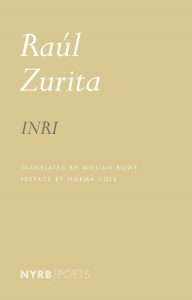
INRI by Raúl Zurita, translated by William Rowe
“My attempt has been to pull poetry and nature together,” Chilean poet Raúl Zurita has said, “because in the end they are the same.” It is hard not to just quote line after line of INRI, which is a poem/lament/cry/hymn/exaltation/exhalation in response to the Pinochet atrocities, including dropping eye-gouged bodies into the sea and mountains and volcanoes of Chile. “The holy plains of the sky burn falling. Human baits fall onto the flaming bush of the ocean. The fish swim up singing with the voice of the sky, shoals, infinities of fish rise up from the sacred waters.” Zurita shows beauty and horror mated.
Jane Ciabattari: Zurita’s outpouring of poetry is a remarkable elegy for the “disappeared” of the Pinochet era, who have merged with the country’s land and sea. Zurita also has inscribed lines of poetry in the sky (via skywriting) and on the desert. In INRI he embeds the falling bodies into their homeland:
People rain down and fall in strange positions like rare fruit of a strange harvest.
Viviana hears surprising human baits raining down, amazing human fruit harvested in strange fields, Viviana is now Chile. She hears human fruit raining down like golden suns exploding on the waters.
He finds ways to personalize:
“Bruno is a little black claw. Susana is a little black claw. The daisies bend screeching. Here are the daisies, the gauze snow on the mountains. The line of surf. I weep for a country that is my enemy.”
How do you think Zurita is able to combine beauty and horror? The language, the rhythms?
Nina MacLaughlin: Part of it, I think, is his use of repetition. There are 133 words on the first page of INRI. Eight of those words are “rain”; seven are “bait”; seven are “sea”; seven are “clear”; six are “love.” The coming and coming of these words is the way nature speaks, the way rain speaks, or waves. The again and again-ness of it, the rhythm of day-night-day, of the tides. There’s something entrancing about the words over and over, a little like watching raindrops on a puddle, but then you realize that the “strange bait” falling from the sky and landing in the sea isn’t rain but people, their body parts. We all know about rain; we all know about the sea; we can picture clear days, sun, sky. And what he does is pair these most familiar forces with one our minds, our imaginations, can barely make sense of: the tossing of mutilated bodies into the sea, serving as “strange bait” for the fishes.
You mentioned how he personalizes things as well, and I think that’s part of it, too. So it’s not just mutilated body matter; it’s Bruno, it’s Viviana, it’s a brother, a sister, a love. There’s no way of making sense of the brutality or the trauma, no erasing it, no solving it. The people who were murdered and tossed into and onto the desert, the volcanoes, the sea, they are consumed by these forces, they become Chile, they become parts of the fishes. They are snow. And I don’t know if that brings solace, but it approaches it, and what more can be asked for.
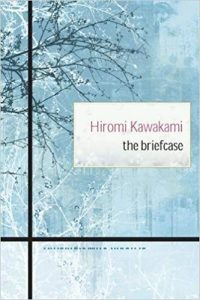
The Briefcase by Hiromi Kawakami, translated by Allison Markin Powell
Much of Hiromi Kawakami’s novel The Briefcase takes place in bars and restaurants in Tokyo (it is one of the great eating-and-drinking novels I’ve read—abalone, octopus, smoked oysters, sake), but even within the city setting, Kawakami shows an acute awareness to the natural world—cherry blossoms, the moon—and the subtleties of each season’s shifts. But it is the two short chapters on mushroom hunting in the mountains that make one feel as they have entered a softer world, of moss, shade, beetles, birds, a place teeming with quiet life, and mushrooms, silent mounds out of earth and moisture, Morasaki mushrooms, iguchi mushrooms, modashi mushrooms, kaki-shimeji mushrooms. They’re hunted and made into a soup there in the forest on the mountain, and how lucky to be invited on this quiet and dim picnic, even just as an observer.
JC: That is a glorious section, with Tsukiko, 37, traveling with her older boyfriend, who she calls Sensei, to a mushroom hunting region with the owner of the bar where they meet frequently. Her reflections show the contrast with her usual urban setting. ”…the undergrowth was alive with all manner of things. Tiny orange mushrooms. Moss. Something that looked like coarse veins on the underside of a leaf. What must be some kind of fungus. Dead beetles. Various kinds of ants. Centipedes. Moths on the backs of leaves. It seemed strange to be surrounded by so many living things. When I was in Tokyo, I couldn’t help but feel like I was always alone….” And that picnic. I wonder if you see a pattern in how Kawakami emphasizes the sensual?
NM: What emerges for me is the tension Kawakami creates. Subtle, gentle, and more and more taut, like a growing need or hunger. The narrator is an office worker, a loner, a woman who drinks and eats alone in bars. The older Sensei was her former literature teacher, a widower, a proper and old-fashioned man. They cross paths in a Tokyo bar; they meet now and then, accidentally then on purpose. Most of what they do is drink together and eat. Over time, like two stubborn vines, they twist together, each with their own will and way, pressing against the strength of the other until they’re coiled tight. It’s not erotic in the conventional sense, but Kawakami has this way of unspooling the love that grows between that has the feel of a plant growing. Like that scene in the forest, all this surging life below the surface. And during that picnic, when they’ve made soup from the mushrooms they’ve foraged, Sensei reveals something about himself that comes as a shock to the narrator. The earthiness of the scene on the mountain is paired with this new depth of knowing, maybe allows for this new depth of knowing. The rhythms of their encounters have so much to do with food and drinking. It’s how they connect—and they’re not eating Twinkies and that liquid convenience store cheese, they’re eating abalone and broad beans and minced bonito and konnyaku, food that comes from the earth. There’s an undertow of hunger in the book, not for sex necessarily, but for connection.
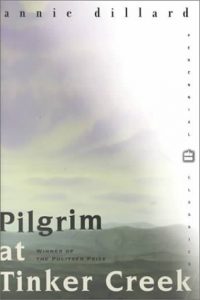
The Pilgrim at Tinker Creek by Annie Dillard
For her lyricism. For her curiosity. For her infectious enthralledness of existing on this strange planet. The raw enthusiasm Dillard shows for what we experience—see smell hear taste feel sense—is an education on paying attention, on seeing what miraculous beautiful terrifying gross-out incredible mystifying stuff can take place after ten minutes of sitting quietly underneath a sycamore tree. Pilgrim at Tinker Creek is a primer on being awake in the world.
JC: What makes Dillard’s Pulitzer Prize winner work for me is the way she alternates between minute descriptions of the natural world and moments when she pulls back and gives perspective: “Our life is a faint tracing on the surface of mystery, like the idle, curved tunnels of leaf miners on the face of a leaf. We must somehow take a wider view, look at the whole landscape, really see it, and describe what’s going on here. Then we can at least wail the right question into the swaddling band of darkness, or, if it comes to that, choir the proper praise.” Do you have favorite passages?
NM: I totally agree with you about her way of microscoping down and then pulling way, way out. She allows us to see the close-up right in front of us, and also the mystery, the cosmic wildness. With Tinker Creek for me, I can open up to any page and find a sentence that gets my blood moving. It’s a book I pick up when no other book is landing and I’ll open it at random and read it before sleep. I had an editor who said he loved books with a lot of good nouns; Dillard is a great user of nouns! Like a horror writer who grounds us in the world we know so we’re comfortable and relaxed and then inserts a monster, Dillard puts us in our backyards, there are robins, kittens, frogs, tulip trees, and then, instead of a monster, she then swings back and brings in infinity or the present or silence (all of which can be terrifying in their ways), and we get there because she’s grounded us so solidly in the world we know.
I’ve just spent the last twenty minutes flipping through looking for a passage to quote here, some representative sentence or two that are especially excellent, but it’s really true, there’s something on every page for me. I could put my finger down anywhere in this book and find something good to share. So, this, at random: “The light crosses the valley, threads through the screen of my open kitchen window, and gilds the painted wall. A plank of brightness bends from the wall and extends over the goldfish bowl on the table where I sit. The goldfish’s side catches the light and bats it my way; I’ve an eyeful of fish-scale and star.”
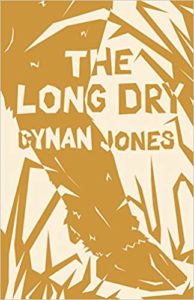
The Long Dry by Cynan Jones
In Cynan Jones’s slim, luminous novel, a pregnant cow goes missing, a rat bites the leg of a tumored old dog, two children negotiate the wonder and cruelty of Welsh farm-life, and Gareth and his wife Kate are knotted in a marriage beset by deep yearning, rage, and care which ranks as one of the truest portraits of love I’ve come across. The book seethes with the brutal squelch of farming, of breeding and bleeding and death (a scene in which two young brothers kill a rabbit with a rock stays with me), and moments of shuddering human frailty and grace.
JC: And there’s also the drought, with its effects on humans, animals, the land—and the marriage. How do you feel about Gareth’s father’s diary as an element in this mix?
NM: I’m glad you asked this. I read The Long Dry almost three years ago, and the diary aspect hadn’t lodged itself in my mind the way the descriptions of farm life and animal life and weather had, and the fraught, fervent way the marriage is presented. So your question made me revisit to see what I’d missed, which, in part, is a note in the back of the book: “The ‘memories’ that run through the book are taken from Hen Arferion a Hen Gymeriadau, recorded to tape by my grandfather David Llewelyn Williams before his death in 1991.” In the book, Gareth reads over his father’s memories; his wife, not sleeping, overhears him “scrabbling for meanings” there. The memories end as the father leaves his bank job for farming and one of the final entries includes: “And what else is there to life other than following the path that brings pleasure and interest to you, without counting the cost or loss, but delighting in those things that are desirable, and that bring you happiness.” For Gareth, fully embedded in the earthy life-and-death hardship and reality of farm life, I think this must sound naïve, over-optimistic, expressed by someone who had not had to reckon with the discomforts and everyday challenges of work and life so deeply rooted to the earth. I see it now as saying how easy it is to romanticize a rural life, a farm life, and how the reality—though not without its pleasures, satisfactions, and triumphs—is a much muddier, bloodier, messier truth entirely.
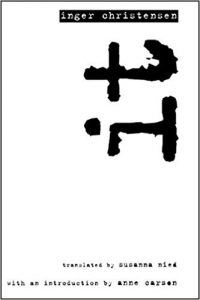
it by Inger Christensen, translated by Susanna Nied
Oh Inger! This book, less a collection of poems and more a union of poems, a move from formlessness to form and back again, turned me upside-down this last year. Christensen writes of the stomach, the sea urchin, semen, stones, sky. The work is deeply sensual, each word injected with the sexual force inherent in language. A wild potent mind-widener of a book. Look at her here:
Turning to new ways to live out a passion
Going out to find the nearest tree and describe it
Finding a tree at any rate And describing it
Throwing the description away Going home
Sitting very still in a chair and having an orgasm
JC: Published in 1969, It imagines a Denmark transformed: “A happy machine/ A wild imagination/ A fantastic din.” Can you think of poets who are following in her experimental footsteps today?
NM: The writer who comes to mind most readily is Anne Carson (who writes a fantastic introduction to it in the New Directions edition). They share an oblique relationship with the erotic. Both give the feeling that using language itself—writing—is an erotic act. I love this vibe. For some of the rhythms and repetitions and the way a reader might sense but not fully understand, Nathaniel Mackey feels kindred with Christensen. There’s a British poet named Matthew Welton who, like Christensen, engages with formal experiments: it has a mathematical structure; her collection Alphabet has 14 sections, each of which is linked with a letter, and the Fibonacci sequence dictates how many lines there are in each section. Welton likewise uses math and music as scaffolding for his lines. And what I appreciate about both poets is that you don’t need to have an awareness of the math behind it to enjoy the organic beauty of the words. What’s compelling to me in fact is how organic the work remains, despite being grounded in numbers and rigid sequence. It can either be ignored or add depth to the experience. Like missing the diary underpinning The Long Dry, it’s testament to the skill of the writers (and maybe the limits of this reader) that the sentences themselves are so pulsing and alive that the framing can go unseen.
*
· Previous entries in this series ·

